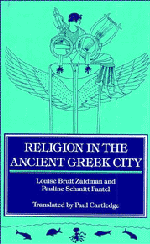Book contents
- Frontmatter
- Contents
- List of illustrations
- Author's preface to the English translation
- Translator's introduction
- List of sources
- PART I Introduction: How should we study Greek civic religion?
- PART II Cult-practices
- 4 Rituals
- 5 Religious personnel
- 6 Places of cult
- 7 Rites of passage
- 8 Settings of religious life
- 9 Religion and political life
- 10 The festival system: the Athenian case
- 11 The Panhellenic cults
- PART III Systems for representing the divine
- PART IV Envoi
- Appendixes
- Bibliography
- Index
5 - Religious personnel
Published online by Cambridge University Press: 05 June 2012
- Frontmatter
- Contents
- List of illustrations
- Author's preface to the English translation
- Translator's introduction
- List of sources
- PART I Introduction: How should we study Greek civic religion?
- PART II Cult-practices
- 4 Rituals
- 5 Religious personnel
- 6 Places of cult
- 7 Rites of passage
- 8 Settings of religious life
- 9 Religion and political life
- 10 The festival system: the Athenian case
- 11 The Panhellenic cults
- PART III Systems for representing the divine
- PART IV Envoi
- Appendixes
- Bibliography
- Index
Summary
INTRODUCTION
We saw from the preceding chapter that no special intermediary was required for the accomplishment of the principal sacred rituals, in particular the offering of sacrifice, and that there was no exclusive repository of sacral wisdom, no clergy, through whose intervention alone communication with the gods might be effected. Rather, it was open to each and every citizen, either in his or her own home or in a public sanctuary, to carry out the actions which both demonstrated piety and allowed those who practised them to affirm thereby their shared identity as Greeks (Hellēnes).
However, outside the sphere of private worship there were a certain number of citizens who were specially charged with religious duties entrusted to them by the city. Moreover, sanctuaries required for their functioning a range of personnel whose status varied from one religious site to another and in proportion to the shrine's popularity and perceived importance.
RELIGIOUS DUTIES DELEGATED BY THE CITY
Religious authority belonged essentially to the people or citizen body as a whole (dēmos), on whose behalf it was exercised by a range of personnel. The number and importance of these civic functionaries grew in the course of the fifth century, at the expense of certain ancient priesthoods. It was their job to maintain order and respect for the laws within the sanctuary enclosure (temenos). They organized the great religious festivals (heortai), in collaboration with other public officials and the relevant priests.
- Type
- Chapter
- Information
- Religion in the Ancient Greek City , pp. 46 - 54Publisher: Cambridge University PressPrint publication year: 1992

